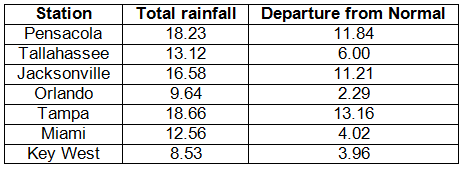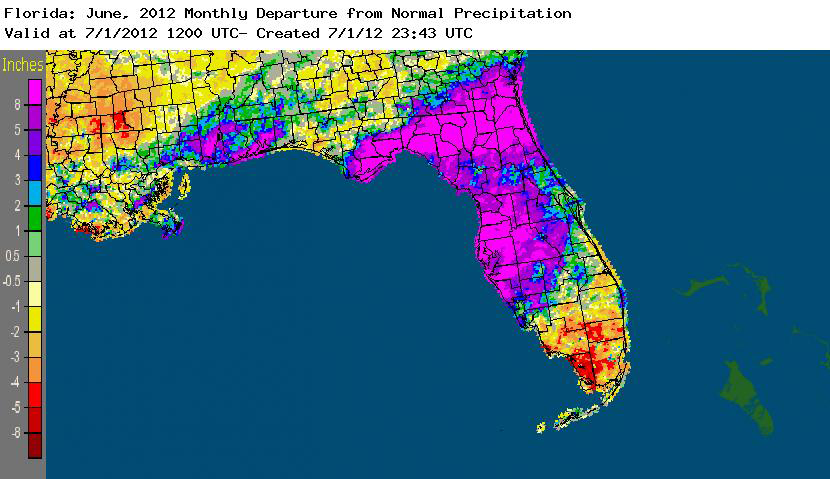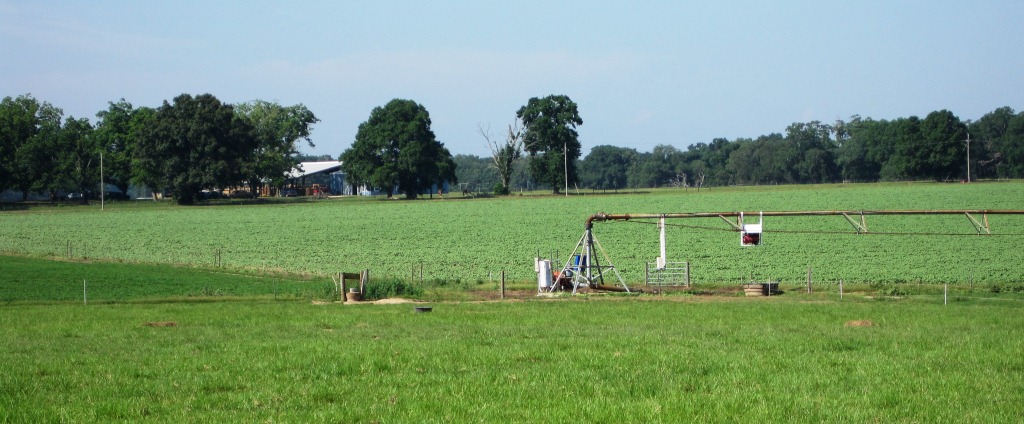|
|
|
|
Dear Florida Climate Center Friends,
We'd like to present you with the July 2012 edition of our newsletter. In this newsletter, you'll find our monthly climate summary, a list of special events that our staff attended, an example of a data request made to the office, and more. If you have any questions, please email us at climate@coaps.fsu.edu.
Thanks,
The Staff of the Florida Climate Center
 |  |  | David Zierden
State Climatologist | James O'Brien
Professor Emeritus | Melissa Griffin
Asst. State Climatologist |
|
June Climate Summary for Florida
The Florida Climate Center's June 2012 Florida Climate Summary is now available. The summary provides an analysis of temperature and precipitation trends across the state, along with data on hazardous weather, drought, the impacts of the weather and any records tied or broken for the month. During June, average temperatures varied across Florida while rainfall totals were well above normal for the majority of the state. El Niņo-Southern Oscillation conditions are still neutral, and above normal temperatures and precipitation are expected through September. Past summaries are archived here.
| June average temperatures and departures from normal (° F) for select cities. |  |
| June precipitation totals and departures from normal (inches) for select cities. |  |
| A graphical depiction of the monthly rainfall departure from normal (inches) for June (courtesy of NOAA, NWS). |  |
|
|
New Temperature and Precipitation Info on Florida Climate Center Website
Temperature and precipitation data for roughly 100 stations in Florida from 2011 has been added to the Florida Climate Center's Climate and Visualization Tool. In addition to the updated data, the center has released a new product known as Multi-Sensor Precipitation Estimates (MPE) Maps. Users can use the tool to visually see accumulated MPE maps over selected time periods, and, when zoomed in, can add features to the simple mapping applications. |
|
Climate and Forestry Workshop
 State Climatologist David Zierden participated in a workshop on climate and forestry on June 12 at the Leon County Extension office. The workshop was hosted by the University of Florida School of Forest Resources and Conservation and the Leon County Extension office in support of the large, multi-institutional research project PINEMAP. Mr. Zierden kicked off the meeting with a presentation on the basics of climate variability and climate change, showing how the El Niņo/La Niņa cycle affects climate patterns and forest management. He also presented information on long-term trends in temperature and rainfall in North Florida and the uncertainty in projected trends for the future. Mr. Zierden then answered question from landowners and forest managers and participated in a follow-up panel discussion. State Climatologist David Zierden participated in a workshop on climate and forestry on June 12 at the Leon County Extension office. The workshop was hosted by the University of Florida School of Forest Resources and Conservation and the Leon County Extension office in support of the large, multi-institutional research project PINEMAP. Mr. Zierden kicked off the meeting with a presentation on the basics of climate variability and climate change, showing how the El Niņo/La Niņa cycle affects climate patterns and forest management. He also presented information on long-term trends in temperature and rainfall in North Florida and the uncertainty in projected trends for the future. Mr. Zierden then answered question from landowners and forest managers and participated in a follow-up panel discussion.
|
|
Sod-Based Crop Rotation System Resilient to Climate Variations
University of Florida Extension at the North Florida Research and Education Center in Marianna, Florida, hosted the Sod-based Crop Rotation System Field Day on June 21. The rotation system advocates adding two years of Bahia grass to the usual peanut and cotton rotation in the Southeast. Studies have shown that this system increases organic material in the soil, leading to higher yields and more efficient use of water and irrigation, which will be critical in the face of a changing climate. State climatologist David Zierden wrapped up the field day with a forecast of weather and climate conditions anticipated in North Florida the remainder of the growing season.
 | | Bahia, Peanut & Cotton rotation study at UF/IFAS NFREC Beef Unit. |
|
|
 Community Outreach Community Outreach
Assistant state climatologist Melissa Griffin took part in several outreach presentations last month, alongside other representatives from FSU's Center for Ocean-Atmospheric Prediction Studies. Towards the end of June, she gave presentations at summer camps hosted by Literacy Volunteers of Leon County, the Tallahassee Housing Authority and the Tallahassee Museum of Natural History. The talks focused on a basic introduction to weather and climate, weather instruments and severe weather. Participants from the camps took part in a variety of activities that ranged from a rain gauge relay race to creating their own weather instruments from candy to making working thermometers. |
|
In The News
Bloomberg.com, 5/30/12
"The soils were so dry the rivers and the ground water aren't responding that much," said David Zierden, state climatologist based at Florida State University in Tallahassee. "It certainly isn't enough to bring us out of drought or make up for deficiencies we have been accumulating for two years."
Tallahassee Democrat, 6/27/12
David Zierden, the official state climatologist and with Florida State's Center for Ocean-Atmospheric Prediction Studies (COAPS), said the cresting Apalachicola and Suwannee rivers will be sending water downstream, possibly leading to localized flooding. "There's no watershed that feeds any river in Wakulla County. Wakulla County would be more affected by local rainfall affecting small rivers and small watersheds," Zierden said.
Orlando Sentinal, 6/28/12
Overall, (David) Zierden said, June is shaping up as one of the wettest on record, with an average statewide rainfall expected to total between 11 and 12 inches; the current June record - 12.4 inches - was set in 1912. |
|
Upcoming Events
Mon, 07/09/2012 - Thu, 07/12/2012
Miramar Beach, FL
ASK Florida Climate Education Teacher Workshop
Mon, 07/16/2012 - Thu, 07/19/2012
Daytona Beach, FL
Thu, 07/19/2012 - Sat, 07/21/2012
Panama City Beach, FL |
|
Example Data Request Each month, we highlight here recent examples of some of the many public services provided by the Florida Climate Center:
In July, the Florida Climate Center worked with a member of the St. John's River Water Management District (SJRWMD) to obtain a variety of historical weather information from long-term weather stations in a few of the watershed basins that fall under jurisdiction of the SJRWMD. The information provided is used by the water supply management division to supplement data they collect to implement a regional strategy to ensure sufficient water for both people and the environment. |
|
About Us
The Florida Climate Center is part of a three-tiered system of national, regional, and state climate offices, including NOAA's National Climatic Data Center and the Southeast Regional Climate Center. The Florida State Climatologist and other staff at the Florida Climate Center provide the following information and services to the people of Florida:
· Climate Data:
Historical weather observations for weather stations throughout the state of Florida. We are able to provide data for most stations from 1948-present.
· Climate Information:
Long-term historical averages for various stations, climate divisions, and the entire state.
· Extreme Event Records:
Information and analyses on extreme events such as freezes, droughts, floods and hurricanes.
· Special Analysis:
With their vast knowledge of El Niņo, La Niņa and climate variability, the State Climatologist and staff can offer expert insight into Florida's climate trends.
· Outreach:
Activities, presentations, and workshops that inform and educate the people of Florida about current and emerging climate issues. We also coordinate volunteers for the Community Collaborative Rain, Hail & Snow Network (CoCoRaHS).
More About Us
|
|
|